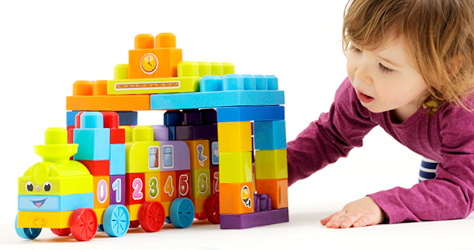Ways babies learn through play
It looks like playing to you, but for your baby this is real work – it’s how they learn to make sense of the world around them. Here’s some advice on getting started for every age.
At a glance
- Different kinds of play will fire up different connections and promote different skills
- Babies don’t learn from the TV. They learn from doing real things not by watching the activity on the screen
- We are our baby’s most important play thing, and they learn most from us

Let's play!
Play is serious work if you’re a baby. It’s how you learn to be a human being.
Every time you touch, feel, taste, hear or see something new, messages are sent to your brain and your brain cells make connections like little bulbs lighting up all over the inside of your head.
The more connections a baby makes, the better their brain will work – which is where parents come in. It’s by playing with our babies and stimulating their interest that we help shape their brain for the future.
Different kinds of play will fire up different connections and promote different skills. Shaking a rattle will promote hand-eye co-ordination, ‘fine motor skills’ (small movements), and the understanding of cause and effect. Reading a board book will help with cognitive development, language, fine motor skills (from turning the pages), visual perception and attention span.
It’s by giving them a good mix of play that we will give them the best chance of developing a healthy mind.
Some things to bear in mind
- You don’t have to spend loads. Your baby will probably be just as happy with some plastic cups or a basket of bits and bobs from the kitchen as a whizz-bang, fancy electronic activity centre. Some research says they actually learn more from household items than ‘proper’ toys because they offer ‘open play’ – in other words, the baby decides themselves what they’re going to do with it
- Babies don’t learn from the TV. They learn from doing real things not by watching the activity on the screen, even if they are mesmerised by the programme and it’s directly aimed at their age group. Some studies say TV can harm babies’ language development because it takes away the time spent learning from you. Watching it with them and pointing out objects and naming them is the only way it’s helpful
- Giving toys for a much older age group won’t push their development ahead. In fact, giving a six-month-old a toy aimed at 12-month-olds may either make them cross because they can’t work it out or they’ll ignore it. Best to stick to roughly the right age group, or follow their interest at that moment
- We are our baby’s most important play thing, and they learn most from us. It doesn’t mean we have to spend every waking moment dangling toys in front of their bemused faces (in fact it’s good to give them some time to play by themselves). But giving them plenty of our time in the first year is an important investment in their development
Here’s a guide to roughly what they might be interested in, and when:
0-3 months: You are your baby’s favourite toy: your smiles, your facial expressions. Also: cot mobile, black and white or high contrast cloth books, mirror, baby gym, pictures of human faces.
4-6 months: Simple ‘cause and effect’ toys like rattles and shakers. Also: toys of different textures, board books, musical toys like a xylophone or drums, toys that fall over and bounce back up.
7-9 months: Stacking blocks/cups, toys with objects ‘hidden’ inside, a basket of baby-safe odds and ends, mini-me toys like mobile phones or keys, shape sorters, soft balls, toys with push buttons and levers, activity centres, books featuring animals, bath toys.
10-12 months: Toys with moving parts, large plastic or wooden cars/vehicles, more complex ‘cause and effect’ toys, building blocks, painting/craft, crayons, puppets, sand/water, push-along walker, role-play toys like plastic food or tools.
Have a look at our month-by-month development guides for more ideas on the games you can play with your baby to boost their learning.
You can also see more about your baby's development with our milestones chart. To help with progression why not visit our educational toys section with top buys and useful info.